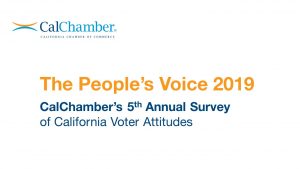
Voters are anxious about the cost of living in California. One of the not-so-surprising consequences of this anxiety: they are reluctant to embrace new taxes to pay for even popular ideas, according to a recently released CalChamber poll, The People’s Voice, 2019.
Nine of 10 voters agree that “earning enough to enjoy a middle class lifestyle is becoming almost impossible in my part of California,” with 52%—an absolute majority—strongly agreeing with that statement. This sentiment is especially pronounced in the Central Valley, Inland Empire and among renters.
The bellwether for California tax attitudes is Proposition 13, and after more than four decades, California voters maintain their attachment to this historic reform. Eighty percent of voters have a favorable view of Proposition 13, including 46% who are strongly favorable. Three-quarters of renters have a favorable view of Proposition 13, as do young people and Democrats. Strong support for Proposition 13 has remained consistent for many years.
Property taxes are not the only forbidden territory marked out by voters. Recent interest in applying the state sales tax to services used and paid by businesses is not shared by voters.
Voters were offered a choice:
- On the one hand, California needs to modernize its tax code and extend the sales tax to cover business-to-business services so that everyone is paying their fair share of the costs of running the state.
- On the other hand, California is too expensive and highly taxed already. We should not extend the sales tax to services because consumers and businesses will just end up paying more and making less.
By a 71% to 39% margin, voters rejected extending the sales tax to business services. Opposition was widespread in all demographic groups: renters and low-income groups were strongly opposed; Democrats opposed by 2 to 1.
A follow-up question suggested that a sales tax on services would reduce state budget volatility, as some of its supporters have argued. That argument was rejected overwhelmingly; voters preferred the state simply live within its means, and save tax money for a rainy day.
Voters continue to strongly agree that climate change is happening now and that the state of California must act now. But that agreement does not extend to taxing cars and gasoline to achieve those goals.
Convincing majorities oppose (60%, with 35% strongly opposed) increasing taxes on automobiles that run on gasoline or diesel to discourage their use. A similar majority oppose (58%, with 35% strongly opposed) increasing taxes on gasoline or diesel to discourage use of internal combustion engines.
California voters have high expectations that their elected leaders address housing, climate change, homelessness, education and infrastructure issues. But they also demand solutions that go beyond the predictable and expensive tax-and-spend template.

